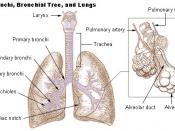The lungs are two organs that are a part of the Respiratory System. The lungs are the main breathing organs. The main importance of this organ is to breathe in and out of your body. If you didn't breathe air into your body, your body would suffocate because your body needs oxygen to survive.
Some functions of the lungs are that it allows you to breathe air in and out of the body. When we breathe air in it goes cown through the bronchial tubes that leads to the lungs. Once the air is at the lungs, the geart passes blood to the lungs which carries the oxygen throughout the body and gives the oxygen to the body parts that need it.
The lungs then take the CO2 left from the breath you took and exhale it. When you exhale, all the CO2 leaves the body and this process happens over and over again.
This happens so you will breathe constantly and you won't have to think about it and suffocate.
Two systems that the lungs interact with are the Circulatory System and the Nervous System. The Circulatory System works with the lungs by passing blood through the lungs to collect oxygen and gives the oxygen to other parts of the body that need it. After this process, the Nervous System tells the brain that the lungs need to exhale the CO2 because it is poisonous to the body.
Several diseases can destroy or deteriorate the lungs. Some are chronic bronchitis, emphysema and lung cancer.
Emphysema is when a person has damaged the alveoli and bronchi. Emphysema weakens the air sacs. Then the air sacs are unable to move oxygen from the air to the blood. Eventually the person may feel breathless. Emphysema is caused from being exposed...


